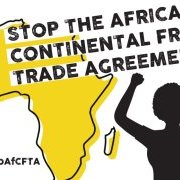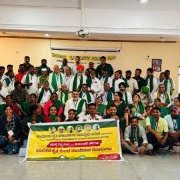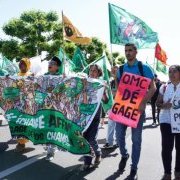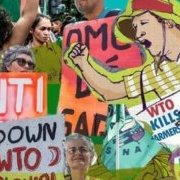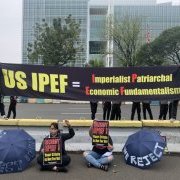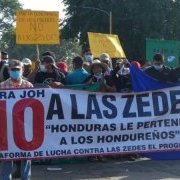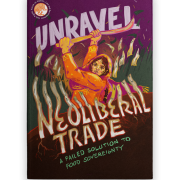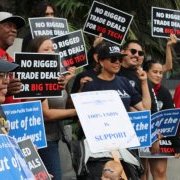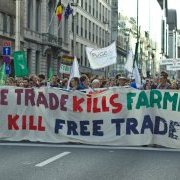23-Oct-2023
Seattle to Brussels Network
Fifty Civil society organizations call on the European Parliament not to ratify the trade agreement with New Zealand.
10-Oct-2023
bilaterals.org & GRAIN
So what does this trade deal mean for ordinary Africans in a time of deep climate, economic and food crises?
3-Oct-2023
Friends of the Earth Europe
Friends of the Earth Europe compiled 7 reasons why the EU-Mercosur is a toxic deal that we must stop now.
2-Oct-2023
The Saturday Paper
Clive Palmer’s move to sue the government in a secretive international tribunal highlights the need to amend Australia’s trade policy to prevent claims that could hamper emissions reduction efforts.
22-Sep-2023
European Coordination Via Campesina
A leaked version of the Mercosur response to the EU’s FTA joint instrument proposal suggests there are increasing negotiation differences between the two blocks.
13-Sep-2023
La Via Campesina
The Indian Coordination Committee of Farmers’ Movement (ICCFM) held a three-day forum in Bengaluru to discuss ongoing trade negotiations in which India is engaged and the impact of the climate crisis on Indian agriculture, among other issues.
12-Sep-2023
La Via Campesina
On this September 10th 2023, the NFU stands united with our allies in La Via Campesina calling for fair and just international trade systems.
11-Sep-2023
La Via Campesina
The peasants, small-scale food producers, wage and migrant workers and indigenous communities of La Via Campesina will draft an alternative trade framework, leveraging our collective knowledge of agriculture and food trade to ensure no one goes hungry.
7-Sep-2023
Ngā Toki Whakarururanga
Ngā Toki Whakarururanga brings a Te Tiriti o Waitangi perspective to the trade policy space, which requires the Government of New Zealand to uphold and actively protect Māori rights to exercise authority over our lands, waters, resources and all taonga. That includes for IPEF.
31-Aug-2023
Public Citizen
Many free trade and investment agreements allow multinational corporations to undermine democracy via a secret pseudo-court system known as Investor-State Dispute Settlement (ISDS).
29-Aug-2023
Third World Network
The proposition that the Indo-Pacific Economic Framework for Prosperity will not be enforceable is an illusion.
29-Aug-2023
Third World Network
Pillar 1 of the Indo-Pacific Economic Framework for Prosperity is entitled “Trade” and is expected to have binding and enforceable trade-related commitments.
23-Aug-2023
Ibon International
Trade justice activists slammed the lack of transparency in the IPEF negotiation process. Social movements have showing resistance to demand prioritising labour, climate justice, and human rights over corporate profits in Indo-Pacific trade talks.
22-Aug-2023
La Via Campesina
It has been twenty years since the World Trade Organization’s imperialist, neoliberal and neo-colonial free trade policies led to the sacrifice of one of our peasant leaders at the gates of the Ministerial meeting venue in Cancun, Mexico.




